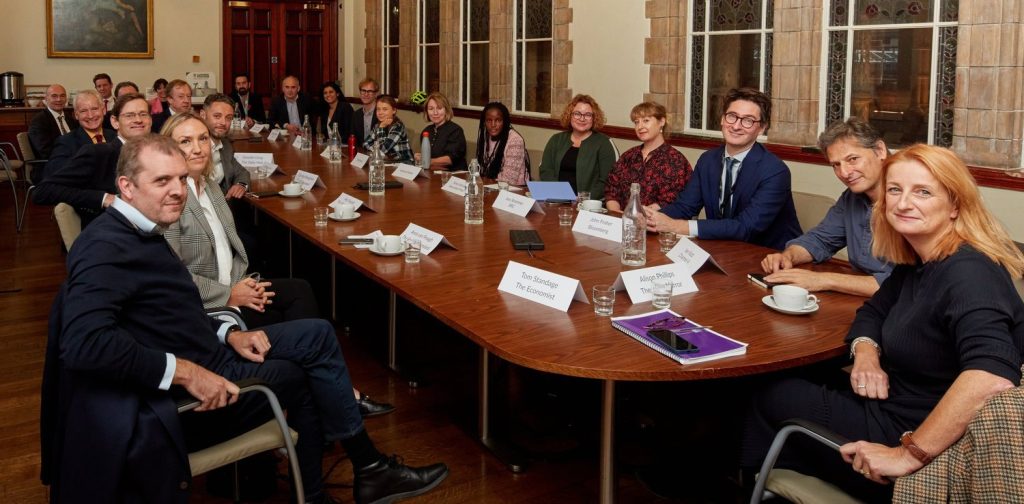Sarah Sands
Partner
Read more


The last time I was in a room full of newspaper editors it was to discuss press regulation, so naturally all ended in mutiny. On Friday, before Greta Thunberg and Vanessa Nakate headed off to protest against investment in fossil fuel projects, and then onto Glasgow, I introduced them to media decision makers in a private, round table discussion hosted by the Natural History Museum.
This time there was a wholly different spirit and purpose. Greta has remarkable convening power, but as moderator I had wondered whether the journalists would feel they were being lectured. They didn’t. Here was huge media influence coming together in one room, abandoning cynicism, ready to listen and to take responsibility for informing the public and holding government to account.
Greta was also ready to listen, facts at her fingertips but never hectoring. Her faith is in the people rather than the politicians and thus she turns to the media. This slight figure, remarkably composed, speaking perfect English, can hold a room of media leaders who reach millions. Alongside her was a figure of comparable charisma, the Ugandan activist Vanessa Nakate, talking of the moral responsibility towards the global south, which is responsible for a tiny percentage of the world’s carbon emissions, yet pays the highest price in loss and damage.

The media leaders talked, under Chatham House Rule, of their commitments and challenges. How to keep readers interested in a story both existential and urgent without overwhelming and alienating them? How to balance short-term gains – energy security – with medium term destruction?
The climate scientist Professor Simon Lewis, who joined Greta and Vanessa at the meeting, does not mince his words about the scale of the threat to “human civilisation”. Lewis claims in his book The Human Planet, that human kind is a geological force, changing everything, forever.
Greta and Vanessa wanted to meet the media decision makers because galvanising public opinion and keeping pressure on governments are crucial if we are going to get to net zero. The media are good at that. Indeed, Greta has said of the media: “You are our last hope.” There was honest self-examination during the session. One editor raised the rule of journalism that you cannot keep doing the same story and keep reader attention, but then observed that coverage of Covid had shattered that rule.
We discussed the lessons from the pandemic, during which media played an important role in informing the public and persuading them to get vaccinated.
There were further insights: television was thought to have an advantage over print in covering climate because of the power of images. Our senior journalists agreed that humanising and personalising the issue helped with engagement. They also emphasised that hope was important.
Audiences, particularly for financial media, like reading about technological solutions. Can journalists discriminate between aspiration and realistic achievement? Can even scientists be sure of what is going to work?
The editors talked about representing climate stories through entertainment or graphics or on the weather pages, in order to keep audiences engaged. It can be a tough sell: according to George Marshall’s book Don’t Even Think About It, our brains are tragically hard wired to avoid thinking about climate change.
Friday was a thought provoking session from a group of media leaders who have power and recognise responsibility. The final words came from Vanessa Nakate, who had found herself erased from media photographs when she spoke at the youth forum in Milan, an editing decision that seemed symbolic of the lack of attention paid to the global south in discussions about climate change. “Whose story are you telling?” she asked.
Then Greta headed off for her next protests, a small, self-contained figure, immediately mobbed by her supporters. An 18-year-old activist who has become a world figure.

I say “no” a lot. As an advisor on sustainability communications, often the recommendation I give to clients is...
Read more
Policy preview: Singapore’s slingThe Organisation for Economic Co-operation and Development (OECD) and G20 agreement to implement a global minimum...
Read more
Policy preview: Uranium’s return?In September, uranium spot prices returned to levels last witnessed in 2012, spurred by hopes that...
Read more
Policy preview: referanda to the rescue?Planning reform has long been seen as a bugbear for the Conservative Party. Even...
Read more
Dollars and sense: internal activism‘Green’ investment funds and public pressure are forcing big oil firms to change their behaviours,...
Read more
Policy preview: ending the debt ceiling?The US’ debt ceiling is among the most despised institutions of US politics, from...
Read more